Global Washington creates monthly issue campaigns using the framework of the Sustainable Development Goals (SDGs). These campaigns spotlight our members who are working to advance the SDGs and we facilitate conversations during in-person and on-line events.
Below is a summary of our 2022 Issue Campaigns, events, spotlights, and features we have been reporting on, culminating with an amazing Goalmakers Annual Conference. We hope you find these informative and useful for your ongoing mission work.
Also, our 2023 Editorial Calendar is published – take a look.
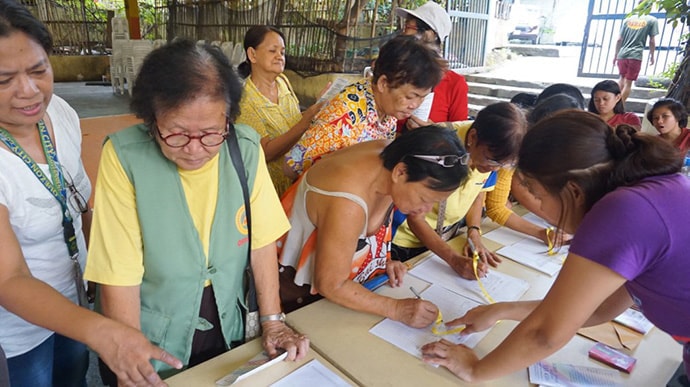
Workshop in the Philippines on Enhancing Domestic Violence Protections for LGBT – 2018. Photo: OutRight Action International
FEBRUARY: Supporting Civil Society – Peace, Justice, and Strong Institutions (SDG 16) and Reduced Inequalities (SDG 10) When the Sustainable Development Goals (SDGs) were established in 2015, the global development community acknowledged the fundamental need to have highly functioning government institutions that support the well-being of people and communities. In fact, experts now believe that SDG 16, which focuses on peace, justice, and strong institutions, is the very backbone of all other goals, and without it, the other goals will not be achieved.
Good governance is often overlooked because it is more evident when a government is not working. Recent events in Myanmar, Ethiopia, and Afghanistan are examples when an internal political crisis resulted in a humanitarian crisis for its citizens. In Afghanistan, nearly 68% of the population is experiencing food insecurity, and in Ethiopia, over 5.2 million people are in need of emergency food aid.
In February, we featured Global Washington members who are working to support SDG 16 within low- and middle-income countries to ensure peace, stability, and a civil society that supports the most vulnerable. We were also honored to host Fatema Sumar January 27th on her book tour: The Development Diplomat: Working Across Borders, Boardrooms, and Bureaucracies to End Poverty.
Issue Brief: If We Do Not Invest in SDG 16 We Risk Conflict and Sliding Back on All of the Other Goals
Organization Profile: OutRight International: Strengthening Institutions and Reducing Inequalities by Advocating for LGBTIQ Rights Around the World
Goalmaker: Adriana Beltrán, Executive Director, Seattle International Foundation (SIF)
BLOGS
One Year Since the Coup, Women-led Protests in Myanmar Need Global Solidary and Action More Than Ever by guest contributor May Sabe Phyu
Martha’s Story: the Struggle for Gender Equality and Land Rights in Liberia by Landesa
How We Creatively Used the Law to Protect Women’s and Girls’ Rights by Women’s Link Worldwide
Effective, Accountable, and Inclusive Institutions are the Backbone of the 2030 Agenda for Sustainable Development by Chandler Foundation
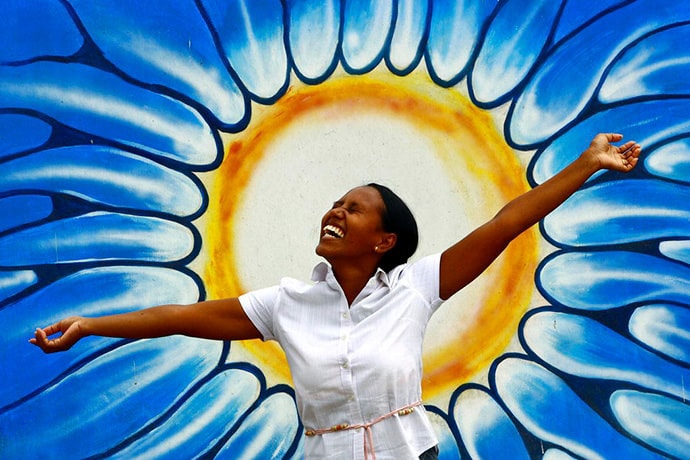
“World Mental Health Day Observance” by United Nations Photo is marked with CC BY-NC-ND 2.0.
MARCH: Mental Health – Good Health and Well-Being (SDG 3) A person’s mental health is fundamental to all aspects of their life. When mental health is good, a person can thrive in work and family. When it is not, there are direct health, economic, and societal detriments. Covid, climate change, conflict, racism, economic insecurity, and natural disasters are just a few of the contributors to poor mental health, especially in low- and middle-income countries. According to the World Health Organization (WHO), 75 percent of people with mental health conditions living in the Global South receive no treatment. According to World Vision, more than 1 in 5 people living in conflict-affected areas have a mental health disorder.
Mental health studies and treatment have historically been underfunded and have not been a priority – in fact, less than 1 percent of health-related global development assistance has ever gone to mental health.
Our March issue campaign highlighted how these trends are changing, mainly due to the necessity of including mental health as a priority for many international aid organizations working in affected areas. Their efforts are pushing the need for good mental health into the spotlight. In 2021, a coalition of NGO’s helped Congress introduce the Mental Health in International Development and Humanitarian Settings Act (or MINDS Act) – the first-ever U.S. legislation that addresses mental health and psychosocial support in foreign assistance.
The stigma associated with mental health disorders often prevents diagnosis and treatment. However, Global Washington member organizations such as PATH, Americares, World Vision, and PRONTO are integrating mental health screening and awareness into their established programs.
Issue Brief: Recent Crises have Forced a Greater Awareness of the Need for Mental Health Programs
Organizational Profile: PATH – Exemplifying Integrated Care and Prevention
Goalmaker: Professor Dr. Pamela Collins from the University of Washington
BLOGS
Super Divya! For the Health and Well-being of Clinical Educators and Clinicians by PRONTO International
Supporting Mental Health Education in Ghana’s Rural Districts by Amplio
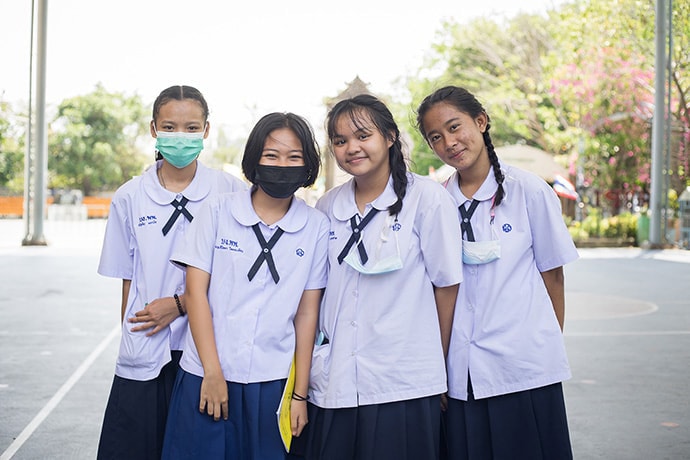
Students in Thailand continue to learn despite COVID-19 school disruptions. Photo: Girl Rising
APRIL: Education and Gender Equality – Quality Education (SDG 4) and Gender Equality (SDG 5) In September 2000, world leaders came together to create the Millennium Development Goals, and one of the goals set was to “ensure that, by 2015, children everywhere, boys and girls alike, will be able to complete a full course of primary schooling.” The concept was access to education, and in particular, getting girls into schools.
As a global community, we have achieved some success in this area. Before Covid, 92% of the world’s 787 million children of primary school age attended school according to UNESCO data. There was an increase in all regions of the world between 1999 and 2019, and most dramatically in Sub-Saharan Africa where rates went from 59% of children in school to 81%.
However, the global development community has recognized that without quality education, girls and boys will never be able to achieve their full potential. The Sustainable Development Goals (SDGs), which guide our work now, stress the need for quality education, vocational training, qualified teachers, and an equitable education as fundamental to generating prosperous and healthy societies. Not just access to education.
Several of our Global Washington members experienced schools shuttering in the past few years due to Covid and conflict. The first goal is to get these students back into the education system, but not at the expense of quality. NGOs such as Sahar in Afghanistan are working to establish skill-based learning for girls to create future income. Other GlobalWA members are expanding their online education they utilized during Covid to reach more students. Rounding out the month’s theme, we held a wonderfully attended event on April 28th: Global Quality Education to Advance Gender Equality with Mona Foundation, Voices of Children’s Faith in Northern Uganda (VOCFINU), Alliance for Children Everywhere, and moderated by APCO Worldwide.
Issue Brief: Education and Gender Equality: It’s about Quality and Context
Organization Profile: Girl Rising Leverages Girls’ Education to Fight Global Poverty
Goalmaker: Robby Kangwa, Education Coordinator, Alliance for Children Everywhere
BLOGS
The Heart of the Solution by Tostan
Transforming Education to Build a Prosperous, Gender-just Society by Mona Foundation
We Celebrate our Environment-focused Members on Earth Day, 22 April 2022
buildOn: Building Schools to Break the Barriers to Gender Equality by buildOn
Education – The Key to Eliminating Poverty by SE Asia Foundation
Sahar: Finding Innovative ways to Educate Girls in Afghanistan, Despite the Risks by Sahar
The Long Road to Recovery (and to the SDGs) Begins with Mine Action by PeaceTrees Vietnam
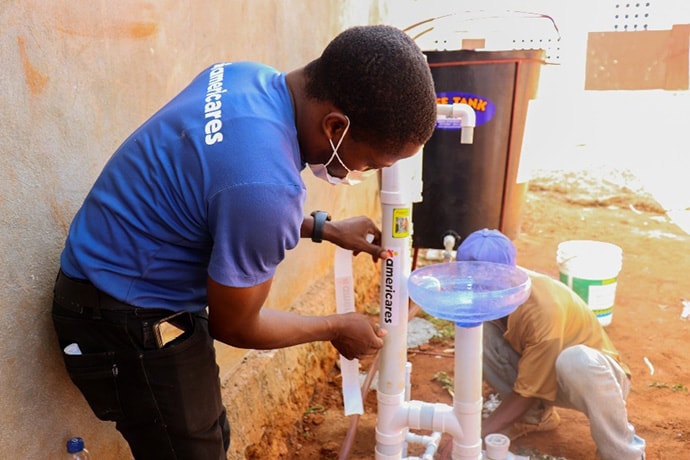
Americares installs a handwashing station at Pointe Sable, Cayemites Island, Haiti, in 2020. Photo by Almando Etienne/Americares
MAY: Clean Water – Sustainable Cities (SDG 11) and Clean Water and Sanitation (SDG 6) It’s estimated that 450 million children around the world do not have access to clean water, which is detrimental to their health, education, household income, and overall community well-being. Climate change and the rise of global conflicts exacerbate the limited resources we have, and children bear the greatest burden.
Sustainable Development Goal 6 outlines specific targets to not only increase access to clean water, but also preserve and improve water-related ecosystems and freshwater supplies. Several Global Washington members are working on SDG 6, and in particular, bringing clean water to children. The ripple effect of these solutions can advance goals for education, hunger, climate action, and reducing poverty.
Issue Brief: For Children, Clean Water Means Everything
Organization Profile: A Q&A between Stephen Sara, Senior WASH Advisor (Team Lead), Save the Children, and Kristen Dailey, Executive Director, Global Washington on May 16, 2022
Q&A: Q&A with Americares WASH Technical Advisor Matteo Cinquemani
BLOGS
Please Don’t Complain About the Rain by World Concern
We Are All Together! By Friendly Water for the World
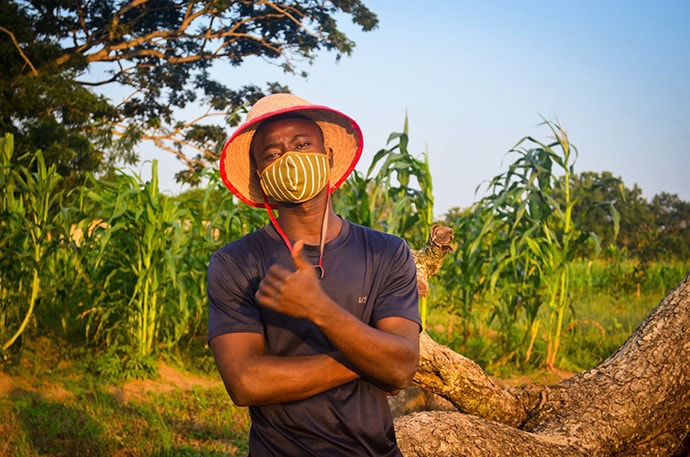
Nigerian farmer. Photo: Abubakar Balogun, Unsplash
JUNE: Natural Capital – Life Below Water (SDG 14) and Life on Land (SDG 15) The term “natural capital” is not well known, but is a significant concept for global development and the Sustainable Development Goals (SDGs). It is best defined as the earth’s natural resources that can be used for economic gain. This could be economic gain for large companies, but it also provides livelihoods for small-holder farmers and small-scale fishers. Without sustainable use of natural resources, those closest to the land and sea would lose their income and often community cohesion.
However, the best solutions for sustainable development of land and sea are often those indigenous communities who have the local knowledge. Several Global Washington members are working in partnership with communities on sustainable use of natural resources as a good source of income. This includes securing land rights for small-holder farmers, scaling sustainable farming and fishing practices, and advocating for equitable supply chains. Furthermore, SDG 12 lays out targets for Responsible Consumption and Production.
Issue Brief: No Shortcuts to Sustainability
BLOGS
Supporting the Tsay Keh Dene’s Efforts to Sustainably Manage their Territory by Earthworm Foundation
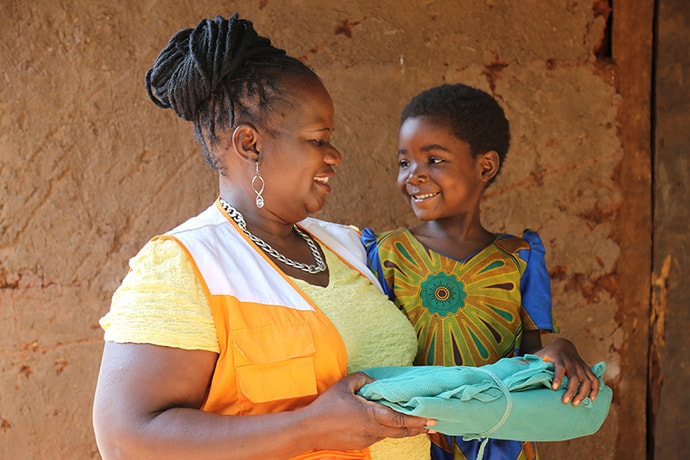
World Vision staff member delivers treated mosquito net to family in Malawi. Photo: World Vision
JULY: Malaria Prevention – Good Health and Well-Being (SDG 3) Global Washington had the privilege of co-hosting the new President of Rotary International Jennifer Jones and the CEO of Rotary International John Hewko in Seattle for an event about their investments in global health: Effective Partnership In Global Health on July 13th. They are partnering with Washington-based Gates Foundation, World Vision, PATH, and Malaria Partners International. It was incredibly inspiring to hear about the past success in polio eradication and how that long-term campaign model could be applied to malaria.
We feel incredibly proud that these Global Washington members are leading this effort, which could impact millions around the world. GlobalWA members exemplify the adaptability and resilience of NGOs in the face of the pandemic, using existing SDG frameworks to restabilize operations in a post-pandemic world. You can read more about these global health interventions in the articles below, as well as a Goalmaker feature story about President Jennifer Jones who is the first female President of Rotary International.
Issue Brief: Unconditional Resilience: How NGOs evolved to survive the COVID-19 pandemic
Organization Profile: World Vision International: Landmark Efforts to Fight Infectious Diseases
BLOGS
Promoting Good Health and Well-Being in Rural Communities by Sehgal Foundation
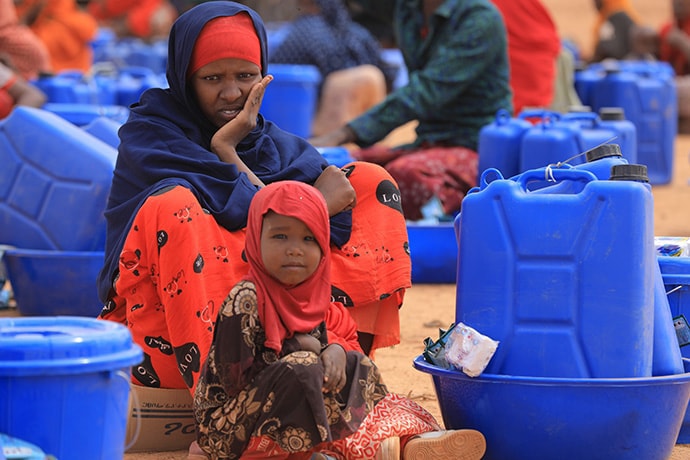
Photo credit: Mercy Corps
AUGUST: Climate Justice – Climate Action (SDG 13) and Affordable and Clean Energy (SDG 7) In August 2022, the U.S. Congress passed landmark legislation that includes climate mitigation and adaptation funding. This is a hopeful step in the fight against climate change that has a disproportionate negative impact on those living in low- and middle-income countries. Climate impacts such as drought, flooding, and increased wildfires are starting to become a universally shared experience.
In low- and middle-income countries, several GlobalWA members are working with local communities to build resiliency to climate change and create climate smart clean energy. In this issue campaign, you can read about Mercy Corps who is working with farmers on climate smart agriculture and cash assistance for emergency relief in the Horn of Africa. You can also read about our Goalmaker this month Rachel McMonagle from Landesa who was in Ukraine in 2013 where she discovered the importance of land rights in building climate resilient farmlands.
Issue Brief: How We Weather Storms: Impactful Approaches to Building Disaster Resilience in Climate Change
Organization Profile: Mercy Corps
Goalmaker: How Landesa’s Rachel McMonagle is Amplifying Land Rights with Empathy
BLOGS
Sustainable Agriculture addressing Climate Action by the Sehgal Foundation
On Trust, Humility, and a Path Forward, from Decolonization Trailblazer Degan Ali
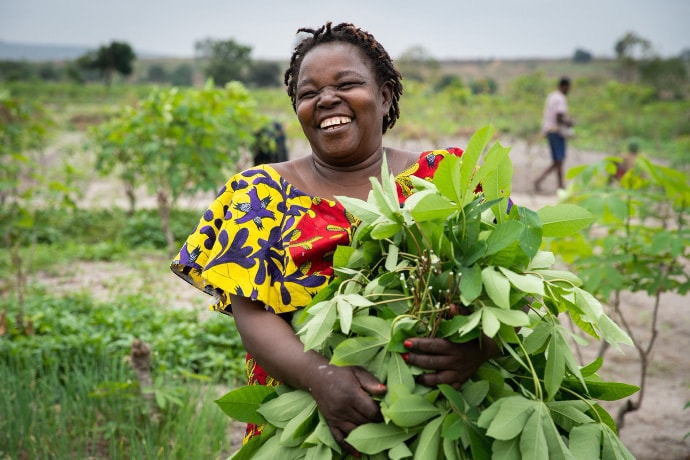
Philomene, a farmer in the DRC. Photo: Opportunity International
SEPTEMBER: Innovation for Inclusive Growth – No Poverty (SDG 1) and Decent Work and Economic Growth (SDG 8) World leaders, diplomats, and global development practitioners from around the globe gathered in September at the UN General Assembly to address critical challenges and “transformative solutions.” While the topics of jobs and economic development were discussed, the opportunity of youth employment should be elevated as a priority. History has shown us that countries thrive when there are employment opportunities for youth entering the workforce. This untapped potential can form the basis of innovative economies, create cohesive societies, and provide stability for individual well-being.
The continent of Africa has the highest number of youth per population than anywhere in the world. By 2030, there will be 375 million young people entering the job market. The next few decades will be a moment in time for countries to catalyze inclusive growth or experience an incredible missed opportunity. Other regions in the world are facing similar circumstances with high youth unemployment and mass migration out of their economies.
However, there are several Global Washington members building the elements and infrastructure needed for future job growth, prosperity, and innovation. From large corporations like Microsoft to smaller NGOs such as Spreeha, each is building financial inclusion for future communities.
Issue Brief: Capitalizing on the World’s Underutilized Workforce
Organization Profile: Sattva Aims to End Global Poverty
Organization Profile: After 51 Years, Opportunity International Defines Their Own Innovation
BLOGS
Small and Growing Businesses Are the Key to Creating Economic Growth That Matters in India by Upaya Social Ventures
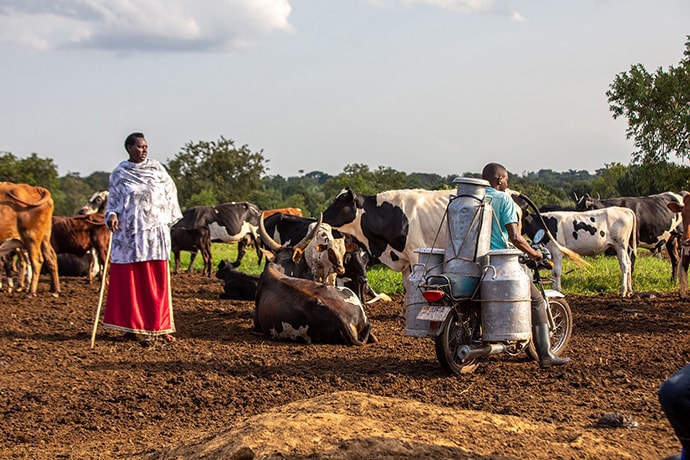
Livestock farmer Edith Nankunda sends milk to her farmer’s cooperative in Kiboga, Uganda to be quality tested and sold. Photo by Zahara Abdul/Heifer International
OCTOBER: Food Security – Zero Hunger (SDG 2) Global Washington is a network of over 150 NGOs, companies, foundations, and universities who are working on one or more targets that will advance the Sustainable Development Goals (SDGs). However, we know that during a crisis and to provide sustained well-being in communities, a comprehensive plan that includes multiple SDGs is the best approach. This is most evident right now to address food security and prevent a famine in the Horn of Africa, Haiti, and several other regions of the world. SDG 2 is Zero Hunger and seeks to end hunger, achieve food security and improved nutrition, and promote sustainable agriculture.
However, we know that food security and solutions needed to prevent hunger include Climate Action (SDG 13), No Poverty (SDG 1), Peace and Strong Institutions (SDG 16), and Sustainable Cities (SDG 11), to name just a few. This is most evident by the impact of the war in Ukraine that has exacerbated a food production crisis in Africa where farmers can no longer afford fertilizer, and imports of wheat have been cut off. Several countries in Africa were already experiencing a drought and internal political instability, which is breaking down community’s ability to respond. Experts from Microsoft Philanthropies, World Food Programme, and the Bill & Melinda Gates Foundation spoke at an event we and Lynden Logistics produced, called Global Food Crisis: The Ripple Effects of the War in Ukraine for Africa and Beyond.
Fortunately, several Global Washington members understand the complexity and root causes of food insecurity and are creating multi-tiered, and multi-stakeholder solutions.
Issue Brief: Resilience and Responsibility in Addressing Food Insecurity
Organization Profile: Heifer Helps Smallholder Farmers Bring Food to the Table, and to the Market
Organization Profile: S M Sehgal Foundation: Improving the quality of life in rural India
BLOGS
ChildFund: Addressing Education and Learning Poverty Challenges
The Intersection of Agricultural Eye Injuries and Food Security by SightLife
Fish is Food: Feeding People, Nourishing Communities by Future of Fish
Land Rights: A Cross-Cutting Solution for Poverty, Food Security, and Women’s Empowerment by Landesa
Nutrition & Food Security: Sukarya’s Ongoing Endeavor Since 1998 by Sukarya
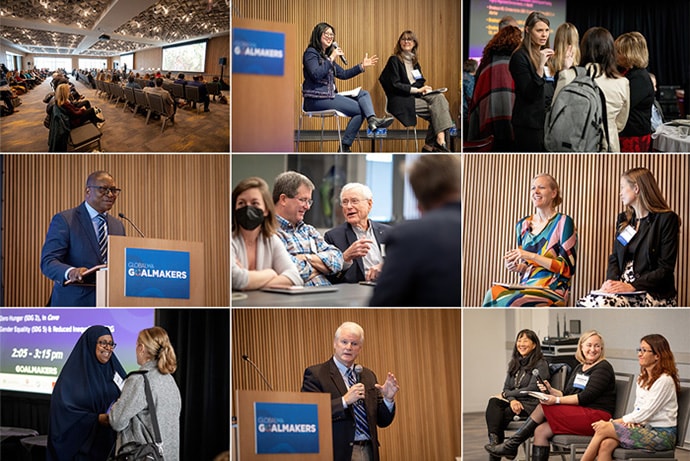
Vignettes of the Goalmakers 2022 Conference. Photos by John Vicory. View more Goalmakers 2022 photos on Flickr.
DECEMBER: Goalmakers 2022 Annual Conference. Our 2022 conference was a chance to connect with old friends and colleagues and spark new partnerships as we met in person on December 8th after an online portion on December 7th. Our focus of the conference was CO-CREATION & PARTNERSHIP.
The Covid pandemic forced global development organizations to examine our work, our internal structures, and our value proposition. Many organizations pivoted to respond to the pandemic and adapted their programs. As the world recovers from the past two years of disruption, organizations are building better, stronger models of partnership rather than going back to the way things were.
Co-creation for global development is a process that centers those in low- and middle-income countries in problem definition, innovative solutions, and program design. It is rooted in trust, relationship building, networks, and partnership.
At our Goalmakers Annual Conference 2022 we had 300 attendees, 72 global expert speakers, and 26 sessions over 2 days, examining models, examples, advantages, and the power of co-creation and partnership, which provided wonderful ideas and inspiration as we move into 2023. We will be publishing a full after-conference report in the next month.